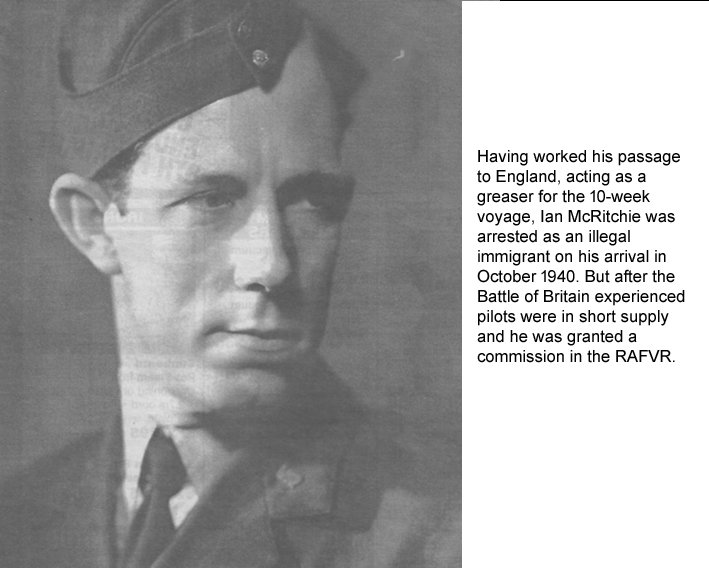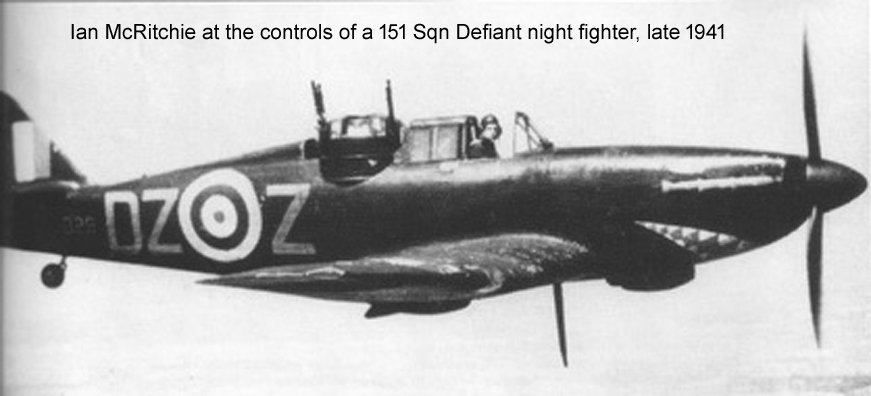WHEN World War II began Ian McRitchie expected to be called up for the RAAF but the authorities had other plans – they wanted Ian, a skilled metallurgist, for the vital tasks of steel-making and heat treatment. As the Germans raced across Europe he made repeated requests to go to England to join the RAF but as he was in a reserved occupation in Australia his requests were refused.
Thanks to his friend Captain J Maitland Thompson, harbour master for Port Lincoln south of Whyalla, he boarded a ship for England as a greaser in the engine room, paid threepence a week plus his keep, that’s 1.5p in today’s money if we still had halfpennies. He arrived in Bristol in October 1940 after a ten-week voyage which earned him 30p (or 12.5p today) and as an illegal immigrant he was promptly detained at His Majesty’s pleasure. Subsequently and fortunately for Ian, the RAAF’s Directorate of Air Force Recruiting gave approval.
But the Battle of Britain was on, the blitz on London was fierce and anyone arriving in the country with instruction experience and a commercial pilot’s licence would be welcome. In November Ian was granted a pilot officer’s commission in the RAF and was posted to 151 Squadron, operating Hurricanes and Defiants in the night fighter role from Wittering.

The Merlin-engined Boulton Paul Defiant has a mixed reputation because of its terrible losses when used as a day fighter earlier in 1940, though most accounts say it was pleasant to fly albeit no great performer due to the weight of the turret. It was designed to Air Ministry requirements as a bomber destroyer with a four-gun turret behind the pilot but no forward-firing armament. The gunner could turn his turret so that the guns could fire along each side of the pilot while the enemy presumably refrained from attacking round the back.
The Defiant resembled the hump-backed Hurricane and some Luftwaffe pilots made the mistake of attacking what appeared to be a novice pilot stooging along straight and level, or of passing alongside to be hit broadside by the gunner. But they soon discovered the Defiant’s weakness and attacked head-on; over Dunkirk the German Me110 pilots were overheard saying “Easy meat” as the luckless Defiants were blown out of the sky. With losses up to 80% the Defiants were withdrawn from day operations.
Ian was given a few months of advanced training before he began operations in June 1941, by which time the night Blitz had reached its heights. Airborne radar was still being developed and had a very short range so the fighters were given steers by ground stations, one method involving a radar-equipped Douglas Havoc using its Turbinlite searchlight to illuminate the target so the accompanying fighter could attack.

On the evening of October 31 Ian and his gunner, F/Officer Sammy Sampson, attacked four Ju88 bombers east of Great Yarmouth. Sammy shot one down while the others jettisoned their bombs and turned for Holland, pursued by the Defiant. They managed to catch up with one and and began a 15-minute battle in which Sammy scored numerous hits before his guns jammed. The Ju88 pilot obviously knew the Defiant’s weakness, for he turned to make a head-on attack which Ian successfully evaded by diving to sea level while Sammy struggled to clear his guns.
With the turret in operation again, Ian chased the bomber almost to the Dutch coast before they could make another attack, Sammy’s four-second burst being seen to strike all over the Junkers. Only then did Ian break away and return to Wittering to claim one destroyed and one damaged.
Luftwaffe activity decreased as winter drew in and weather deteriorated, but Ian and gunner Sgt Albert Beale destroyed another Ju88 which was trying to attack a convoy off Great Yarmouth. This was 151 Sqn’s only kill for November, but at long last airborne radar was improving and even better, so were the aircraft. As a New Year dawned, 151 Sqn was told they were to re-equip with Mosquitos.